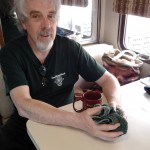Third Indymedia Journalist Killed
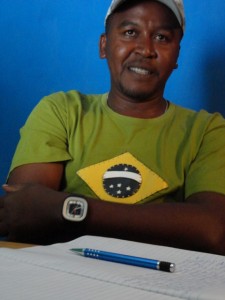 From Wren—I’ve been posting a lot of death on HCD these days. Our pet goats, some activist friends. It’s surreal to read about the death of former Monkees singer Davy Jones. The Monkees were a part of my subversive childhood, and my early awareness of the struggle of principled people trying to operate in our crazy corporate world. But on my same planet, in my lifetime, other courageous people are facing stakes I can’t imagine. The post below is from Indymedia, reporting on the assassination of a journalist and organizer in Nairobi. He was known to us through Indymedia. The story doesn’t detail the convoluted politics that put him in the crosshairs. I can’t do that story justice here, but I want to honor Stephen Nyash today. When I think about the loss of my home and my goats, and ask myself if I’m sacrificing too much to Occupy and culture change, I have to remember that there are sacrifices we in America haven’t been asked to make…yet.
From Wren—I’ve been posting a lot of death on HCD these days. Our pet goats, some activist friends. It’s surreal to read about the death of former Monkees singer Davy Jones. The Monkees were a part of my subversive childhood, and my early awareness of the struggle of principled people trying to operate in our crazy corporate world. But on my same planet, in my lifetime, other courageous people are facing stakes I can’t imagine. The post below is from Indymedia, reporting on the assassination of a journalist and organizer in Nairobi. He was known to us through Indymedia. The story doesn’t detail the convoluted politics that put him in the crosshairs. I can’t do that story justice here, but I want to honor Stephen Nyash today. When I think about the loss of my home and my goats, and ask myself if I’m sacrificing too much to Occupy and culture change, I have to remember that there are sacrifices we in America haven’t been asked to make…yet.
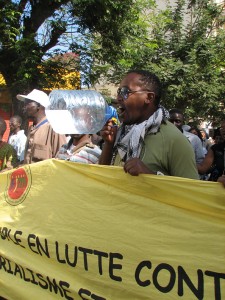 So even as the economic divide widens and radicalizes the people dropping off the edges of safety and security , Congress passes laws to imprison us without habeas corpus. Now they’ve passed a law that makes protesting illegal. Before these moves, I was hearing of the Guantanamo style concentration camps being prepared. C.T. and I have a friend who is an African activist. He was shot for trying to organize students in his country. Now an activist and filmmaker in the US, he is not completely free of the fear of assassination. We Americans like to go about our days as if that kind of thing doesn’t happen here. But it does.—WT
So even as the economic divide widens and radicalizes the people dropping off the edges of safety and security , Congress passes laws to imprison us without habeas corpus. Now they’ve passed a law that makes protesting illegal. Before these moves, I was hearing of the Guantanamo style concentration camps being prepared. C.T. and I have a friend who is an African activist. He was shot for trying to organize students in his country. Now an activist and filmmaker in the US, he is not completely free of the fear of assassination. We Americans like to go about our days as if that kind of thing doesn’t happen here. But it does.—WT
__________________________________________________
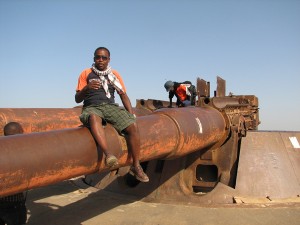 Kenya Indymedia has reported that on Tuesday, February 21, radio journalist and organizer Stephen Nyash was shot dead in the Korogocho ghetto of Nairobi, where he had lived and worked for most of his life. Korogocho is the third largest slum in the world [1]. At writing, the motive for his murder is not clear.
Kenya Indymedia has reported that on Tuesday, February 21, radio journalist and organizer Stephen Nyash was shot dead in the Korogocho ghetto of Nairobi, where he had lived and worked for most of his life. Korogocho is the third largest slum in the world [1]. At writing, the motive for his murder is not clear.
Nyash was one of the founders of KOCH FM [2], a close partner of Kenya Indymedia. He was also a leader in “Koch Hope” and “Ghetto Films,” which worked to empower the slumdwellers of Korogocho. He brought this wealth of experience to the fourth IMC-Africa Convergence in Senegal last March as a representative of Kenya Indymedia. He was also integral in organizing a “Conference of People” held in Korogocho to coincide with the Conference of Parties (COP-17) gathering on climate change. Fellow organizer John Bwakali writes, “From the moment that he knew about Kenya Indymedia, Nyash became not just an active participant but fellow leader of the movement… Upon return [from Senegal], he immersed himself into the vision and work of Kenya Indymedia.” Read John’s Full Reflection HERE [3] and his audio interview with Nyash [4] on the fight against State injustices.
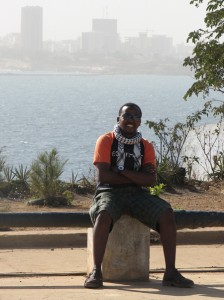 To our knowledge, Nyash is the third Indymedia worker to be killed. On June 29th, 2004, 23-year old Lenin Cali Najera of Indymedia Guayaquil in Ecuador was assassinated by agents of the Ecuadorian government [5, 6]. On October 27, 2006 Bradley Roland Will of New York City Indymedia was assassinated by paramilitary forces of the Mexican government while documenting the on-going struggle of the people of Oaxaca. [7, 8]
To our knowledge, Nyash is the third Indymedia worker to be killed. On June 29th, 2004, 23-year old Lenin Cali Najera of Indymedia Guayaquil in Ecuador was assassinated by agents of the Ecuadorian government [5, 6]. On October 27, 2006 Bradley Roland Will of New York City Indymedia was assassinated by paramilitary forces of the Mexican government while documenting the on-going struggle of the people of Oaxaca. [7, 8]
Nyash will be buried on 3 March 2012. He is survived by his wife, three year old daughter, ten year old son and mother. Kenya Indymedia is accepting donations for burial expenses and the family’s needs, and plans to set up a fund to continue his work toward justice for the oppressed particularly in the slums; peace at the community level and economic empowerment and protection of young people. For the short term, donations can be sent via paypal to fagim564@newschool.edu.
More on KOCH FM From Deep Dish/Waves of Change [1]:
Who we are?
Koch Fm is the first ghetto community radio in Kenya. It was started in 2006 by a group of 10 youths in Korogocho slums. Our motto is: Edutainment – Educating through entertainment!
Where?
The radio is situated in Korogocho slums which is the third largest slum after Kibera and Mathare.
Why?
The radio was started in order to provides a platform for Korogocho people to address their issues through information sharing, education and communication to promote social, political and economic well-being of its listeners. The radio’s aim is to give a voice to the voice-less by mobilizing, lobbying and advocating for human rights issues using different radio programmes. Koch FM highlights issues like gender empowerment, HIV and aids, insecurities, poor governance, poor sanitation, children’s rights and youth & talent.
A tribute to Stephen Nyash by John Bwakali, Kenya Indymedia, as published on ciranda.net [3]:
NYASH’S LIFELONG COMMITMENT TO A BETTER LIFE FOR SLUM DWELLERS
Nyash almost always had a big smile pasted on his face.
But lurking behind this smile was a deep passion for the less fortunate people and against the injustices that they suffer. The injustices of the State both locally and globally together with the many injustice of poverty.
Earlier this month of February, I had lunch with Nyash in Korogocho ghetto, where he spent most of his life. We had agreed to meet at Othaya, a popular nyama choma (roast meat) restaurant in Korogocho.
I arrived a bit earlier than him and when he arrived, he was spotting his trademark smile. He apologized for being late, noting that he had been concluding several meetings. I understood, because I knew that Nyash was either leading or deeply involved in many initiatives towards making life better for the people of Korogocho.
Within moments of his arrival, Nyash began assisting the waiter to serve the people who were flocking into the restaurant. He moved from table to table, chopping steaming meat and washing the hands of the people. He wasn’t doing this because he worked there but because he noticed that the sole waiter at the place was swamped with work.
As he was serving the people next to my table, he flashed that big smile at me and said cheerily, ‘sisi ni watumishi wa community – we are servants of the community.’
These five words best describe how Nyash lived and died – serving the community that he loved. Serving the people of Korogocho slums to put food on their table, seal leaking roofs, take their children to school, fight crime, make better roads, leave peaceably, find decent livelihoods and speak out.
Nyash did all this through Koch FM, the community radio station that he co-founded and chaired; Koch Hope, another organization which he co-founded that provides bathroom, conference and recreational services to the people of Korogocho; Ghetto Films, an organization that informs and empower slum dwellers through film and Kenya Indymedia, a movement that provides a platform for community activists to find unity and clarity in their common voice for the people.
From the moment that he knew about Kenya Indymedia, Nyash became not just an active participant but fellow leader of the movement. Together with three other activists, he represented Kenya Indymedia in Senegal during the Indymedia collective that was held there. Upon return, he immersed himself into the vision and work of Kenya Indymedia.
In our last ‘Conference of People’ event, Nyash played a pivotal role by mobilizing local activists and stakeholders. He also ensured the venue was available and later on organized lunch for the organizers.
I last talked with him on Saturday 18th of this month. Because I was then in Lamu Island, we agreed to meet on Wednesday 22nd so that we could prepare a strategy outline for Kenya Indymedia’s work for 2012.
Sadly on the morning of this day that we were to meet, I received text message from Roba, a Kenya Indymedia member and renowned activist musician. The text read simply that, ‘we have lost Nyash, bonge la maandamano Koch.’ We have lost Nyash and people all over Korogocho are demonstrating.
Nyash had been gunned down a few hours earlier outside his house in Korogocho. He was shot in the chest and stomach and didn’t make it to hospital. It is still not clear who committed this brutal and evil act. What is clear is that although they took away his life, they can never take away his legacy.
I will now leave you with his own words, ‘sisi ni watumishi wa community – we are servants of the community.’
The best tribute we can pay to our friend, comrade and brother Nyash is to ensure that his service remains alive and active by continuing to serve the people of Korogocho slums and those in our own societies who are less fortunate.
NB: Kenya Indymedia will meet and consult widely on how both the local and international community of activists can best pay tribute to Nyash by contributing to a concrete project that will help his family and the people of Korogocho.
Citations:
1 – Indymedia Radio Activist Shot in Kenya
http://deepdishwavesofchange.org/blog/2012/02/indymedia-radio-activist-shot-kenya
2 – KOCH-FM Facebook Page
http://www.facebook.com/pages/KOCH-FM-Fan-Page/193358480704745
3 – A tribute to Stephen Nyash by John Bwakali, Kenya Indymedia
http://www.ciranda.net/porto-alegre-2012/article/6165
4 – audio interview with Nyash on the fight against State injustices
http://kenya.indymedia.org/images/Nyash%20Speaks%20out.mp3
5 – Ecuador IMC activist assassinated
http://www.indymedia.org/or/2004/07/111397.shtml
6 – Carta a Lenin Cali
http://ecuador.indymedia.org/es/2004/07/5906.shtml
7 – NYC Indymedia Journalist Brad Will Shot Dead by Government Forces in Oaxaca
http://nyc.indymedia.org/en/2006/10/77757.html
8 – The New York City Independent Media Center responds to the death of Brad WILL
http://www.indymedia.org/en/2006/10/849515.shtml
Subscribe to this blog's RSS feed
Liberty at a Distance
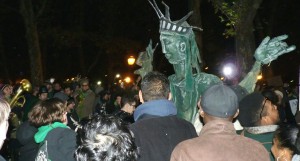 In all my travels to New York City I’ve only ever seen the Statue of Liberty from a great distance. And every time I’ve pulled into Philadelphia I’ve remarked that I have yet to see the Liberty Bell. I arrive in your town to organize, to breathe life into the American myth of Freedom.
In all my travels to New York City I’ve only ever seen the Statue of Liberty from a great distance. And every time I’ve pulled into Philadelphia I’ve remarked that I have yet to see the Liberty Bell. I arrive in your town to organize, to breathe life into the American myth of Freedom.
This doesn’t leave me a lot of free time.
As C.T. and I sat in a New York bistro, the air was uncharacteristically quiet as the sound system played Paul Simon singing American Tune. I felt some sort of vague gut punch at how applicable that song and its shellshocked mood is to the Occupy movement.
I don’t know a soul who’s not been battered
Don’t have a friend who feels at ease
Don’t know a dream that’s not been shattered
Or driven to its knees.
But it’s all right, all right, We’ve lived so well so long
Still, when I think of the road we’re traveling on,
I wonder what went wrong, I can’t help it
I wonder what went wrong.
I first heard this song, not from Paul Simon’s recording, but the bubble-gum group Starland Vocal Band. They were known for their harmonies, and they did a beautiful, defeated rendition I haven’t heard since the 1970’s. Hearing the song pops me back to those days, and thinking about Bill and Taffy Nivert, the songwriters at the core of SVB, who actually had some songwriting chops, collaborating with John Denver on “Country Roads” and others. But this is a passing thought as the lyrics play on. I move on to memories of hearing this song in busy moments, and stopping to appreciate how it captures the fall of empire. I’m heartbroken at the trap of American individualism, and the lie of the American Dream. Sometimes I’m struck at the coma the programmers must be in when they plan this song to play in malls. I imagine Paul Simon himself worked such thoughts out long ago, and is pensive all the way to the bank.
Here are the lyrics in full:
Many’s the time I’ve been mistaken, and many times confused
And I’ve often felt forsaken, and certainly misused.
But it’s all right, it’s all right, I’m just weary to my bones
Still, you don’t expect to be bright and Bon Vivant
So far away from home, so far away from home.
I don’t know a soul who’s not been battered
Don’t have a friend who feels at ease
Don’t know a dream that’s not been shattered
Or driven to its knees.
But it’s all right, all right, We’ve lived so well so long
Still, when I think of the road we’re traveling on,
I wonder what went wrong, I can’t help it
I wonder what went wrong.
And I dreamed I was dying. I dreamed my soul rose
unexpectedly, and looking back down on me, smiled
reassuringly, and I dreamed I was flying.
And far above, my eyes could clearly see
The Statue of Liberty, drifting away to sea
And I dreamed I was flying.
We come on a ship we call the Mayflower,
We come on a ship that sailed the moon
We come at the age’s most uncertain hour
And sing the American tune
But it’s all right, its all right
You can’t be forever blessed
Still, tomorrow’s gonna be another working day
And I’m trying to get some rest,
That’s all, I’m trying to get some rest.
Recycling Our Bed: Serenity Gets a Queen
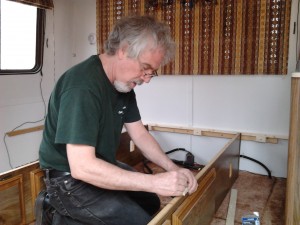 One major point of having Serenity, our rolling house/office, is to maintain that sense of home. We can cook our own healthy food, we have books, movies and music with us, Tuatha has his dog toys and knows that when we leave him in Serenity, we’re keeping him safe at home, where we’ll return.
One major point of having Serenity, our rolling house/office, is to maintain that sense of home. We can cook our own healthy food, we have books, movies and music with us, Tuatha has his dog toys and knows that when we leave him in Serenity, we’re keeping him safe at home, where we’ll return.
One nice comfort of home is sleeping in one’s own bed. We’re not on a hotel mattress, or a host’s sofa sleeper. We’re home. This is a point I care about, because I have arthritis and a bad back. I am particular about the surface I sleep on. I seem to do better with air mattresses or waterbeds generally, so in our motorhome, the choice was air.
But the devil always gets you in the details: The motorhome we ended up finding, that was it, and the perfect one, was imperfect in one detail: The back bedroom had two twin beds.
This will not do. Looking at the two beds with the built-in nightstand between, I constantly flashed back to The Dick VanDyke show, and poor Rob and Laura Petry who were not allowed to share a bed on prime time television. Weird how far we’ve come. And yet, the sex that gets shown is usually just a different way of oppressing people…
So C.T. and I designed and discussed. We consulted and conjured. It felt exciting to rip out the built-in frames of the twins, and to design the new queen bed platform using those pieces, planning for the little access doors to be functional. We expect to store two EZUp canopies under the bed, for impromptu workshops. We can keep extra tables and out of season clothes there. Living in an rv, we are learning how to maximize our space use.
Since we plan to travel the country with enough copies of C.T.’s books for the various Occupys, we have to account for the weight we add to the motorhome. We also have to plan how to distribute that weight. If we find ourselves in a jackknife situation on some highway, the weight distribution could be the difference between life and death.
It’s empowering to take responsibility for ourselves in this way. We have to learn the inner workings of all Serenity’s systems, and diagnose problems. We can change things and remodel. We can gut it, paint it purple, whatever.
No good DIY project is complete without a minor injury that bleeds profusely. This time it was C.T.’s turn, as he lost control of a screwdriver that stabbed him in the finger! Ouch!
In 1986, when Serenity rolled off the assembly line, few people had personal computers. and few would have thought of bringing such electronics with them on an rv trip. So it’s only the latest rv’s that have computer consoles. We need two or three, for our team.
So we plan to tear out a swivel chair in the living room and a vanity sink in the bedroom to create space for computer stations. And we’ll have to get mobile hot spots or some such things to have reliable internet. Right now, we’re mooching off our hosts, who allow us to park next to their house. They’ve provided a 100 foot internet cable and a plug in for 30 amp electrical service, which they had installed for our visit. We haven’t started using the water systems in Serenity yet. So we go into the house for showers, dishwashing, etc. But as the warm weather arrives, we’re considering starting up the water.
In the meantime, today will see a bulletin board mounted for project notes. The sun is dancing with the ocean breeze outside, where the dog is meditating in the grass. Life in Serenity goes on!
What the Cops Throw Away…Our First Visit to OWS Union Square
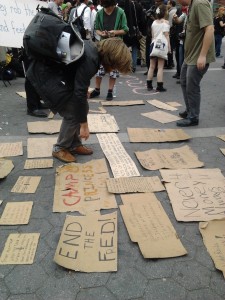
Pick up a sign to hold, or read an unfolding story. But hurry, the police/trash collectors are headed this way.
On Wednesday C.T. and I traveled into New York City for a meeting with the affinity group helping us organize a Spanish translated consensus workshop. There had been some thought to have the meeting at Union Square, the real estate Occupy Wall Street is newly claiming. And we had heard stories about occupiers’ first actions and sparring with police at Union Square. So even though we were meeting in the opulent comfort of the lattice and palm tree lined atrium at 60 Wall Street, C.T. and I left the subway early to check out the action at the new protest site.
The first picture I took was this one, of handmade cardboard signs laid out on the ground, like so many Occupys around the country. Sometimes it’s an art installation, sometimes the signs are spread out so you can pick one to hold out toward traffic.
No sooner did I snap my shot and pivot did I encounter a very grumpy gaggle of NYPD and park police, six or eight of them at least, who were pushing a large plastic trash bin on wheels toward the signs. They were followed by a wave of dozens of protesters, anyone who could track the bin, all taking pictures and calling out remarks about the pettiness of the police.
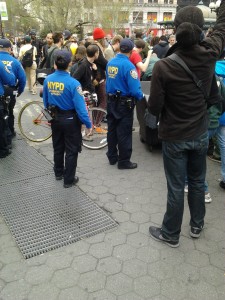
So many people were taking pictures of the cops picking up "litter," that this is as close as I could get for my own shot.
One officer started picking up the signs and tossing them in the bin, sometimes handing them to another officer. A protester circled the scene, urging other Occupiers not to get caught up in the provocative behavior of the NYPD.
It was a moment in time, after a night that saw several OWS activists arrested after midnight, and through 4 a.m. It was a moment in time before the 6 p.m. rally in honor of Trayvon Martin, the Florida teenager killed by a neighborhood watch captain.
Several members of our affinity group didn’t make our meeting at 60 Wall St. I imagine they felt a strong pull to attend the rally, which was also attended by Trayvon’s parents.
Later, on the train back to Long Island, a passenger told us the subways around Union Station had been closed by the police. This is a tactic they use before a “scrape,” or mass arrest. So C.T. and I worried for our friends. And when we got home, we did find an internet pic of one affinity group member being dragged by police in the early morning arrests (“That was 4 a.m.—He was out by the time of our meeting—Where was he?!?” C.T. joked), but there was no news about arrests associated with the rally.
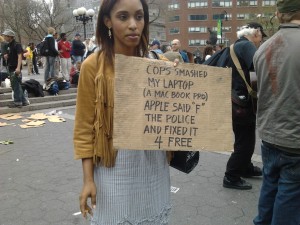 Another day on the Direct Democracy Tour.
Another day on the Direct Democracy Tour.
How long will OWS hold Union Square? Will they try to repeat the encampment? I don’t know these things, any more than I know how long C.T. and I can remain with the Occupy flagship. Our rv’s furnace is out, but spring is here. We don’t have much funding, but we have more eager students than ever.
There’s no mistaking the community and public spectacle that is a mass protest. That sense of being a part of the solution, a part of something larger 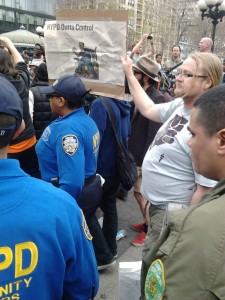 that yourself. There’s the speaking truth to power, or at least power’s security force, when a protester shames a cop for making up some law to enforce on the spot (“No suitcases…No libraries!” They warned me and C.T. last November). It’s electrifying. It’s something to do, when the only clothes you can afford were probably made by slaves, and the degree that cost you six figures earns you a convenience store existence.
that yourself. There’s the speaking truth to power, or at least power’s security force, when a protester shames a cop for making up some law to enforce on the spot (“No suitcases…No libraries!” They warned me and C.T. last November). It’s electrifying. It’s something to do, when the only clothes you can afford were probably made by slaves, and the degree that cost you six figures earns you a convenience store existence.
For some people, like this protester shadowing a Community Affairs officer with an article saying, “NYPD Outta Control,” things have gone so far that boldness and risk-taking replace comfort and free time. Other people seem to still be at home, plugged into the Matrix.
More people will come with the early spring. And C.T. and I are here in New York, saying to activists that consensus doesn’t have to be the shouting match/power play they experienced in Occupy’s infancy. We want these newly minted activists, this year’s and last year’s crops, to know that true consensus looks and feels very different from what they’ve experienced with the Madrid model.
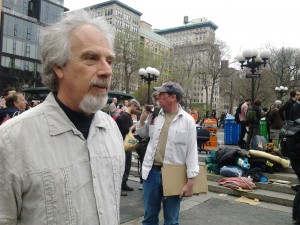 So as the nation and OWS rally over the killing of a Black teenager C.T. and I organize to hold a Spanish-translated Consensus: Body and Soul workshop. We pour over facebook invites and funding opportunities. We make calls and make lists. And when enough pieces are in place, we get on the train for the face to face organizing. It’s not as sexy as a rally, but it’s our form of witness.
So as the nation and OWS rally over the killing of a Black teenager C.T. and I organize to hold a Spanish-translated Consensus: Body and Soul workshop. We pour over facebook invites and funding opportunities. We make calls and make lists. And when enough pieces are in place, we get on the train for the face to face organizing. It’s not as sexy as a rally, but it’s our form of witness.
Maybe you have sidewalk chalk or a saxophone.
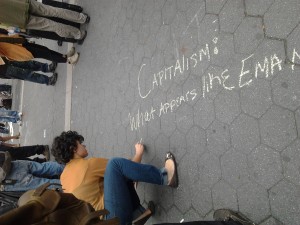 When you can’t stay away any longer, you’ll be like Richard, a man who wandered over to our Spanish workshop affinity group meeting at 60 Wall. He asked to sit in. We welcomed him and advised him to just observe, since he was not a member of our affinity group. After a half hour of listening to nine people speak the language of value-based consensus, with jargon like “level one discussion,” and “values embedded in the structure,” Richard couldn’t stand it anymore. “I hate to interrupt,” He said, not stopping himself from doing so. “But I don’t understand a thing you all are talking about. What is your group’s purpose???”
When you can’t stay away any longer, you’ll be like Richard, a man who wandered over to our Spanish workshop affinity group meeting at 60 Wall. He asked to sit in. We welcomed him and advised him to just observe, since he was not a member of our affinity group. After a half hour of listening to nine people speak the language of value-based consensus, with jargon like “level one discussion,” and “values embedded in the structure,” Richard couldn’t stand it anymore. “I hate to interrupt,” He said, not stopping himself from doing so. “But I don’t understand a thing you all are talking about. What is your group’s purpose???”
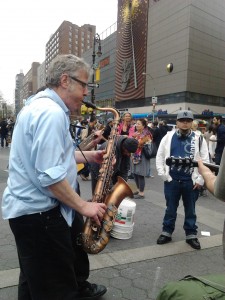 In the meeting role of doorkeeper, I took him off to the side and explained that C.T. Butler is the cofounder of Food Not Bombs and author of several books on consensus and that the rest of the group are his students, learning how to conduct meetings not ruled by privilege and oppression. Richard told me he had never been an activist outside of his own mind before, and this day, the day that OWS had moved to Union Square, the day that the Trayvon Martin rally pulled half of our affinity group out of a nearly empty 60 Wall St., was his first time venturing into this world.
In the meeting role of doorkeeper, I took him off to the side and explained that C.T. Butler is the cofounder of Food Not Bombs and author of several books on consensus and that the rest of the group are his students, learning how to conduct meetings not ruled by privilege and oppression. Richard told me he had never been an activist outside of his own mind before, and this day, the day that OWS had moved to Union Square, the day that the Trayvon Martin rally pulled half of our affinity group out of a nearly empty 60 Wall St., was his first time venturing into this world.
It must have been boggling for him to have our group, with it’s new culture and strange language, be his first contact.
But don’t be boggled. When you can’t stay away any longer, bring your sidewalk chalk or your saxophone or a favorite children’s book you can replace when the police arrest it, and arrive in the river of people. Just make sure that one of your first appointments is a consensus workshop. Learn how, even with all the love in our hearts, we still bring privilege and oppression with us into situations of hope and repeat the same old patterns. Learn the language of breaking that pattern.
Then speak our new truth to power.
—WT
Please join our Hippie Chick Diaries fan page on Facebook!

